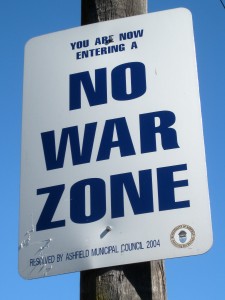Chances are good that during your lifetime you’ve never seen a legal war. This is because December 11th will mark the 70th Anniversary since congress last declared war against another country, pursuant to the U.S. constitution. Of course this means that all the wars now being waged, all the police actions, overseas contingency operations, and non-war-wars have been carried out against the spirit and letter of the law.
Since late 2001, more than 260,000 members of the various states’ National Guard troops have been deployed in support of the “war on terror.” Not since the Second World War have so many guardsmen been sent overseas. One thing in common with these deployments was that a state governor allowed them to go. That should end now. If we’re going to demand the constitution be followed with every issue, every time, no exceptions, no excuses, we must do so with this as well.
According to the late Henry Hyde, Chairman of the House International Relations Committee at the time of the Iraq war, declarations are “Inappropriate, anachronistic, [they aren’t] done anymore.” So there you have it. They’re not needed, the president can just send in the troops, and there’s no accountability. Sound familiar? It should.
It’s the same with every other usurpation by the federal government. They don’t follow the rules and none of them care. So what can be done about it? State nullification, of sorts.
The historical precedent for states asserting their autonomy with regards to their militias is compelling. During the war of 1812, several of the New England states refused to commit their troops in support of the war. Citing the constitution’s authority to have the militias “execute the Laws of the Union, suppress Insurrections and repel invasions,” the president ordered Massachusetts and Connecticut to deploy their militias along the coast. Both states refused.
Caleb Strong, governor of Massachusetts, asserted that the states themselves would be the judge of whether or not that clause was applicable. If the militias were called out, and those three conditions were unmet, the legislature of Connecticut resolved that it “would be not only the height of injustice to the militia, but a violation of the constitution of the United States.” These are especially bold, given that at the time, the U.S. was engaged in a lawfully declared war. Furthermore, naval and land combat was being waged within the boundaries of the United States. Neither of those conditions has been met with the current wars.
During the 1980s, President Ronald Reagan ordered several states to send their National Guard units to Central America for training. The issue became a Supreme Court case when Pennsylvania refused. It was ultimately decided that states could indeed withhold their troops, under the following two conditions: 1) the deployments would interfere with training schedules and, 2) reduce the state’s ability to respond to disasters.
The recent history concerning states attempting to reassert authority over their own guard forces is encouraging. In at least twelve states, from Massachusetts to Montana, and California to South Carolina, governors, state legislatures, and city councils have pushed to regain sovereignty over their guardsmen. Though largely symbolic, these events could signal the beginning of a movement toward more local control of National Guard troops. Along with reducing the U.S. overseas footprint, this would also provide states with their full compliment of troops for disaster relief.
It was widely regarded as ridiculous, and rightly so, that following the devastation of hurricane Katrina active duty troops were deployed to Louisiana, because that state’s guard forces were in Iraq. When I returned from my first deployment to Iraq in early 2006, my unit immediately began training in order to respond to a natural disaster. I was stationed near Savannah, GA, and because one of Georgia’s National Guard brigades was deployed in Iraq, they wanted us ready just in case. This is madness.
It’s true that withholding the states’ National Guard forces will not end the wars, and will not force Washington to suddenly adhere to its own laws. It will however put additional pressure on the Pentagon to draw down forces overseas. Without access to hundreds of thousands of troops, there will be no choice but to reduce troop levels abroad.
It will also help to increase public awareness of the importance of adhering to the law. There’s a pattern that has developed over the United States’ history, where the length and success of military action is dependent on whether war was officially declared. Wars that were legally declared had clear objectives and were relatively short in duration, the average length being only four years. Undeclared wars however, are subject to mission creep, and on average last more than nine years. Let’s reverse this trend and restore state sovereignty: every issue, every time.
The Tenth Amendment Center has prepared model legislation that can be used to begin requiring governors uphold their obligation to their states. You are encouraged to send copies of this to your state representatives and senators, with instructions to introduce it at the earliest legislative session.


